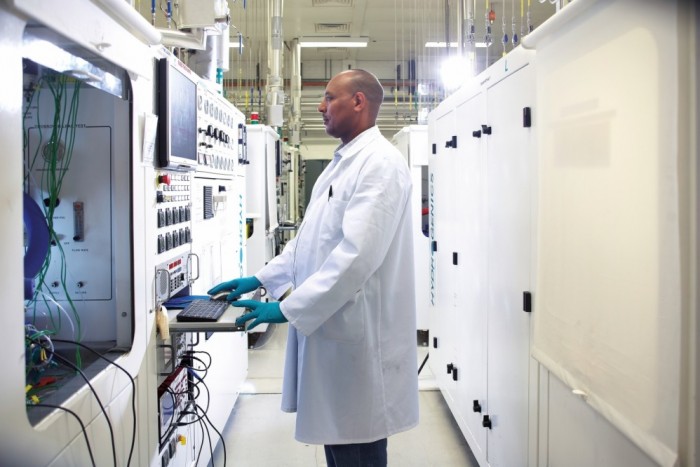Johnson Matthey – Becoming a High-Volume Stationary Power MEA Manufacturer
Johnson Matthey Fuel Cells (JMFC) has delivered 27,000 membrane electrode assemblies (MEAs) to project partner Nedstack Fuel Cell Technologies (NFCT). NFCT has built them into 360 fuel cell stacks and delivered these stacks to the DEMCOPEM-2MW system integrator, MTSA Technopower.
JMFC is a well-established developer and manufacturer of MEAs, and has supplied Nedstack with MEAs exhibiting very long lifetime with low decay rates. These were originally fabricated in relatively small volumes using discrete part methods of production that were unsuitable to larger quantities. JMFC has worked to redesign the MEA to make it suitable for production in high volumes, by using higher throughput production processes.
JMFC technical leader for the DEMCOPEM 2MW project, Dr Paddy Hayes, commented, “This represents a significant effort by our science and technology teams and also our manufacturing development and quality teams. The development work required many prototype MEA design iterations and catalyst ink and coating trials to perfect the optimised MEA product, which was also capable of high volume production. Our production team then had to work at a high rate of production whilst maintaining quality standards in order to deliver the MEAs for the project.”
A major challenge was the incorporation of continuous roll-to-roll coating methods to produce the electrodes. Previous individualised production methods did not require the use of a rollable gas diffusion layer substrate, and could be coated, dried, treated or otherwise processed on a unit basis. To produce electrodes in high volume, the coating operation and all subsequent processes had to be achieved in a roll-to-roll fashion.
Johnson Matthey Fuel Cells has invested heavily in the equipment and processes required to produce fuel cell MEAs in high volume. The DEMCOPEM project provided an invaluable opportunity to focus our scientific and process development resources on the volume production of an MEA.
Johnson Matthey Fuel Cells has invested heavily in the equipment and processes required to produce fuel cell MEAs in high volume. The DEMCOPEM project provided an invaluable opportunity to focus our scientific and process development resources on the volume production of an MEA.
Dr Hayes continued, “It has been great to see MEAs for such an exciting application being produced in volume at high quality. I had the opportunity to see the NFCT-built stacks when they were delivered to the system developer, MTSA, when I visited their facility for the consortium meeting, and I’m looking forward to seeing the power plant in operation during testing and later at the customer’s site in China.”


Figure 1: Johnson Matthey Fuel Cells’ MEA production facility at Swindon, UK, where the DEMCOPEM MEA was developed and produced.
Figure 2: JMFC’s fuel cell test facility at the JM Technology Centre, Sonning Common UK. Prototype DEMCOPEM-2MW MEAs were tested for performance, stability and durability using a range of diagnostic measurements.


